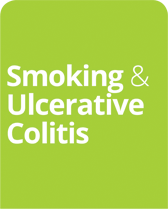Smoking and Ulcerative Colitis
Ulcerative colitis (UC) is largely a disease of non-smokers. Improvement of symptoms has been seen in patients resuming smoking, having previously given up.The reason for this apparent improvement has been attributed to the nicotine content of the cigarette and reasons why nicotine may be beneficial include:
- It increases the adherent surface mucus in the large intestine which is reduced in UC. The mucus acts as a protective barrier to the mucosa which may be damaged by bacteria and breakdown products in the intestine.
- It may have an inhibiting effect on the inflammatory response of the body.
- It may relieve proximal constipation
A recent study was conducted on patients with known left-sided colitis using nicotine patches of 5mg increasing to 15mg doses (equivalent to 5-15 cigarettes) over 6 days. This was compared to the effects of a placebo. The dose was increased to 25mg if there was no response after two weeks. An improvement of symptoms was seen in both groups, but the nicotine group showed greater improvement.
The study does, however, has some major flaws:
- There was improvement in the symptoms of 17 out of 35 patients in the nicotine group compared to 9 out of 37 in the placebo group, but the proportion in each group who had complete endoscopic or histological remission was not stated. Histological improvement was marginal therefore supporting evidence for medical use of nicotine is weak. The study did show the positive power of the placebo response, i.e. if you think it is going to work, it often will.
- The majority of patients were also receiving anti-inflammatory treatment and the effect of the dose of 5-ASA or low dose corticosteroid may have contributed to the apparent improvement.
- Some patients withdrew from the trial due to severe side-effects, non-compliance or due to a worsening of symptoms. These results were not included in the final analysis although they should be recorded as treatment failures.
Proximal (right-sided) constipation is frequently associated with distal (left-sided) colitis and relapses of the disease. Nicotine has a known laxative effect on the bowel which may explain some of the benefits of smoking in maintaining remission in UC.
However, smoking has a detrimental effect on general health, such as:
- increased risk of coronary heart disease.
- increased risk of lung disease - it is also well documented that smoking causes lung cancer.
- increased risk of peripheral vascular disease (blood clots and narrowing of the leg veins).
- reduced absorption of vitamins and minerals and altered taste perception of foods.
- reduced general fitness.
- premature ageing of the skin.

